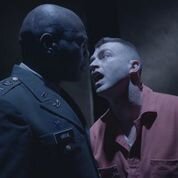By Marilyn Jozwik
Next Act’s “9 Circles” was almost a victim of the pandemic. It’s a good thing it wasn’t, though, because it’s one of the most riveting pieces of theater I’ve seen.
One week into rehearsals more than a year ago, the whole country shut down and there was no saying if and when Bill Cain’s intense story of an Iraqi War veteran on trial for murder would see the light of stage.
But it has. And through May 16, the virtual show is available for viewing. Visit https://nextact.org for details.
Directed by Michael Cotey, “9 Circles” refers to the chapters in the military life of young soldier Daniel Reeves (Casey Hoekstra), a Texan with a personality disorder. He is just the sort of person who should not be sent into battle, some say. Yet, Reeves sees his disorder differently: “It’s to my advantage. I don’t mind killing people.”
The play is based on a heinous war crime committed during the Iraqi War and depicted in the book “Black Hearts,” by Jim Frederick.
Daniel Reeves (Casey Hoekstra), left, talks to his lawyer (David Cecsarini) in a scene from Next Act’s “9 Circles.”
We follow Reeves in shadowy scenes, from his tirade at a lieutenant (David Cecsarini) for serving him discharge papers, to his days of imprisonment and trial. Along the way, through lawyers, a pastor and a psychiatrist, we learn about Daniel’s past – his single mother who made him man of the house, his run-ins with the law, his drug and alcohol habits pre-military. He is a ticking time bomb.
Reeves has loved being a soldier, identifying those days as the best of his life. The military also has given him a chance at real empathy. A horrifying, yet also tender, incident is emblazoned on his mind.
We learn about the horrors of war, the impossible moral dilemmas presented to soldiers in modern warfare every day, the toll it all takes on bodies and souls. Humanity becomes hard to see in the jungles of battle in which soldiers become like animals – prey and predators.
Hoekstra is a human storm, erupting like a volcano at the dichotomy of war and morality that his superiors want him to see, although he cannot. His inner struggles bubble over when he talks to the people trying to save him. At first he seems like a callous, incorrigible, morally bankrupt human being – except we see that this war fits those descriptions as well. “Everything we did over there is a crime over here,” says one lawyer.
Cain’s characters make some interesting historical references, including comparing the Iraqi War to the 1571 Battle of Lepanto, a naval conflict in which Christians of the fleet of the Holy See defeated the Muslim Ottoman Turks who had been invading Europe. Cain, a Jesuit priest, also includes the Biblical story of Jesus and a Syrian woman who wanted Jesus to help her daughter.
Daniel Reeves (Casey Hoekstra) gets in the face of an army attorney (Chike Johnson).
Next Act’s video production is first-rate, from the lighting (Noele Stollmack) and sound (Grover Hollway) to the amazing quartet of performers.
Reeves’ mental pain is worse than any physical damage and Hoekstra makes that pain palpable. When confined to a straight-jacket, his fast-heaving breaths are akin to those of a leashed dog ready to attack. He gets up in the face of the pastor and psychiatrist, exercises in manic fits, screams until you think he’ll burst. At times we loathe him; at other times we want desperately for someone to understand him, to wrap their arms around him and tell him, “It‘s OK.”
We begin to realize that there were many Daniel Reeveses sent off on impossible tasks and that they were let down by many people.
Hoekstra heads the outstanding foursome of performers, which also includes Malkia Stampley, Chike Johnson and the aforementioned Cecsarini, each handling multiple roles.


